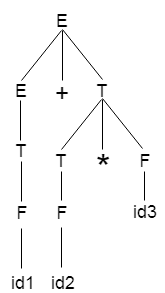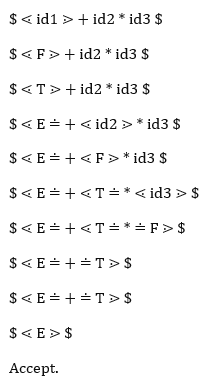Operator precedence parsing
Operator precedence grammar is kinds of shift reduce parsing method. It is applied to a small class of operator grammars.
A grammar is said to be operator precedence grammar if it has two properties:
- No R.H.S. of any production has a∈.
- No two non-terminals are adjacent.
Operator precedence can only established between the terminals of the grammar. It ignores the non-terminal.
There are the three operator precedence relations:
a ⋗ b means that terminal "a" has the higher precedence than terminal "b".
a ⋖ b means that terminal "a" has the lower precedence than terminal "b".
a ≐ b means that the terminal "a" and "b" both have same precedence.
Precedence table:

Parsing Action
- Both end of the given input string, add the $ symbol.
- Now scan the input string from left right until the ⋗ is encountered.
- Scan towards left over all the equal precedence until the first left most ⋖ is encountered.
- Everything between left most ⋖ and right most ⋗ is a handle.
- $ on $ means parsing is successful.
Example
Grammar:
E → E+T/T
T → T*F/F
F → id
Given string:
w = id + id * id
Let us consider a parse tree for it as follows:

On the basis of above tree, we can design following operator precedence table:

Now let us process the string with the help of the above precedence table:






No comments:
Post a Comment